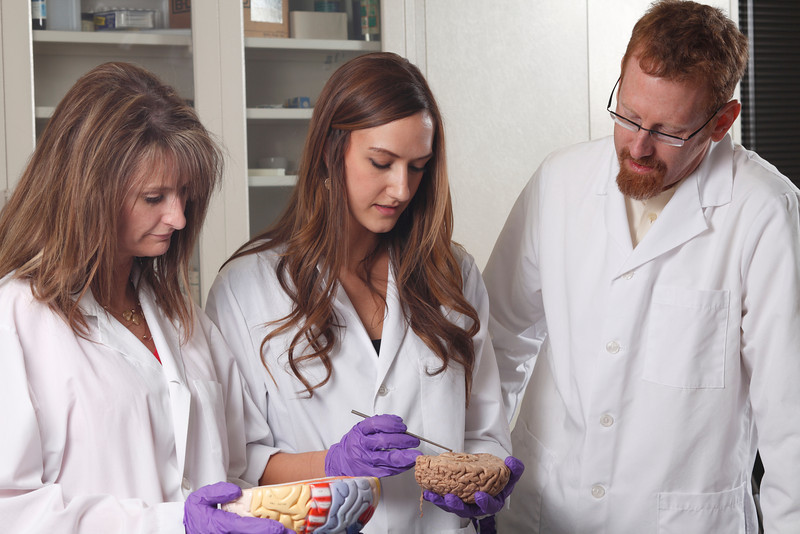| |
Feb 02, 2026
|
|
|
|
|
2019-2020 Catalog ARCHIVED CATALOG: Content may no longer be accurate.
Neuroscience Minor
|
|
 Return to: Engaged Learning, Honors, and Interdisciplinary Programs Return to: Engaged Learning, Honors, and Interdisciplinary Programs
Coordinator: Dr. Todd Hillhouse, 801-626-6247, toddhillhouse@weber.edu
Location: Lindquist Hall 394
Telephone Contact: Roe Schoof, 801-626-6293
Neuroscience is the interdisciplinary scientific study of the central and peripheral nervous systems in an effort to understand the biological basis of behavior, thinking, emotion, memory, and perception.
- Credit Hour Requirements: A minimum of 18 credit hours as described below. For advisement contact the Neuroscience Program Coordinator who will help you select courses which will compliment your major.
- Grade Requirements: A grade of “C” or better in courses used toward the Minor (a grade of “C-” is not acceptable).
- Program Code: 7044
- CIPC: 261599

Dr. Matt Schmolesky with Neuroscience students
Courses
Neuroscience Course Descriptions
|
Course Requirements for Minor
For advisement contact the Neuroscience Program Coordinator who will help you select courses which will compliment your major. To complete the Neuroscience Minor, the student must complete a minimum of 18 credit hours as follows: a) Introduction to Neuroscience (NEUR 2050 ), b) one course each from the three content areas (Cognitive/Behavioral, Cellular/Molecular, and Clinical/Medical), and c) 6 credits of electives. Students that have not already completed ZOOL 1110 LS - Principles of Zoology as part of their major will also need to complete this course before taking the Cellular and Molecular area requirement. Thus, completion of the Neuroscience Minor may require 23 credit hours for some students. With approval of the Neuroscience Program Director and the applicable Department Chair, students may apply credits from one of the required courses of either Area 3 or Area 5 towards both their minor and major to offset the number of prerequisites necessary for courses in these areas. Only one course total may be applied to the minor and major, and only after the appropriate approvals have been received. 2. Cognitive and Behavioral Area: 1 of the below
3. Cellular and Molecular Area: 1 of the below
4. Clinical and Medical Area: 1 of the below
5. Electives: 6 credits minimum from the electives listed below
‡Note:
‡These courses must have a significant neuroscience focus in order to qualify as an elective towards the neuroscience minor; approval by the Neuroscience Program Direct is required in advance. Note:
Consult the WSU course catalog for prerequisites to the elective courses listed above. Area 6: Lab Requirement
Students must complete at least one science lab course (in any subject) to complete the neuroscience minor. This can be included as part of a course (for example, CHEM 2310), or as a separate class (for example, CHEM 3075 or NEURO Lab). Area 7: Graduation Sign Off
Students must meet with the program director. |
 Return to: Engaged Learning, Honors, and Interdisciplinary Programs Return to: Engaged Learning, Honors, and Interdisciplinary Programs
|
|